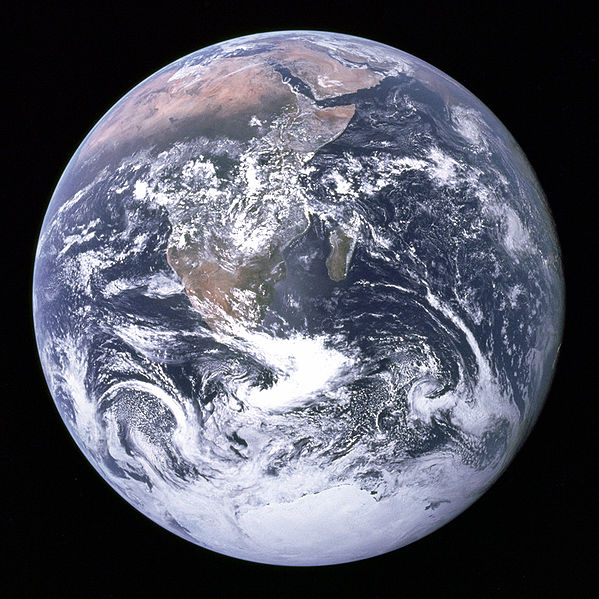Could We Feed the World Right Now
Sarah - The problem of how we might feed the earth's population in the future has come under further scrutiny this week with the publication of Agrimonde - a book that is the summation of two years of work by two French institutions - INRA, the French National Institute of Agricultural Research, and CIRAD, which carries out agricultural research to help developing countries. Despite the study being carried out by two French Institutions, the book has been published in English, in order for the results to be more accessible on the world stage. I travelled to Paris for the launch of the study and spoke to Patrick Caron from the institution CIRAD about how even today we struggle to feed everyone on Earth...
 Patrick - There is a very big problem - we're used to finding food in the supermarket and having money in our pockets to pay for that food. But that's not the case in all countries, and not even the case in our own country sometimes. We have to remember that 1 billion people in thwe world are suffering from what is unacceptable. one death from malnutrition is one death that should not be accepted for ethical reasons. human history has been paved with this problem, and starvation has always been part of our history, but in the 1970s we discovered a tremendous growth in population at the world level.
Patrick - There is a very big problem - we're used to finding food in the supermarket and having money in our pockets to pay for that food. But that's not the case in all countries, and not even the case in our own country sometimes. We have to remember that 1 billion people in thwe world are suffering from what is unacceptable. one death from malnutrition is one death that should not be accepted for ethical reasons. human history has been paved with this problem, and starvation has always been part of our history, but in the 1970s we discovered a tremendous growth in population at the world level.
Sarah - And it's the continued increase of this population growth - predicted to reach 9 billion people by 2050 - that is causing concern. Now, concern about feeding the growing population isn't new, but this is the first study to integrate looking at patterns of food production and consumption over the past forty years, with two possible scenarios for how we might proceed with providing the world with food in the future. The first they called Agrimonde 1. In this scenario, the world is characterised by sustainability - so a decrease in both undernourishment and overconsumption, ecological intensification of farming, and security of trade. The second scenario, called Agrimonde GO, is kind of the 'business as usual' scenario, where food production increases year on year as it has done in the last 40 years, trade is liberal, and little thought is given to environmental impact of feeding the world. Agrimonde 1 would involve a lot of changes, not just with agriculture but also our eating habits. The current world average daily calorie consumption is 3000 kilo calories, but this is not evenly distributed - in some areas people eat a lot more, like in Europe and the united states, and in some people eat a lot less. The aim for the scenario Agrimonde 1 is to have everyone eating 3000 kilocals a day, irrespective of where they live. The way people consume and waste food is an area that Agrimonde looked at in detail, and an area which will need to see changes, as Marion Guillou from the French National Institute for Agricultural Research explains...
Marion - Eating habits are different in different parts of the world. Our European habits for example are not sustainable. First there are health questions, and then it's not sustainable if all the world began to eat as we do, as it would put a pressure on production that would be tremendous. So what we did was we looked at a scheme of eating habits that is compatible with good health, i.e. 3000 kilocalories, and then we looked at whether it is possible to feed the world with this sort of eating habit all around the world, and the answer is yes, but with some questions we need to answer.
Sarah - And given that the institutions INRA and CIRAD both carry our agronomic and agricultural research, this is one of the ways we could innovate in the future. Genetic techniques could be used to increase yields, either by genetic modification to produce pest resistant or salt tolerant varieties of wheat or corn, or by marker assisted selection - a way of making the old fashioned method of plant crossing to produce varieties with the characteristics you want more efficient. But producing these new varieties will not be the whole story. Francois Houllier from French National Institute for Agricultural Research...
Francois - If we consider the agricultural challenges we face and the different solutions we may imagine, we need to consider the way we grow our crops. By this I'm thinking of the nitrogen and different fertilisers we use, and the pesticides that we need to reduce. We also have to think about the rotation of the crops. We will need to combine different approaches, different disciplines and different techniques.
Sarah - So, we need to adopt an integrated approach to increasing food production and we need to change our eating habits and stop wasting so much food - not exactly an easy fix, but if we can manage these things, then the conclusion of the book was that yes, we will be able to feed the world...
mccallburnournswes.blogspot.com
Source: https://www.thenakedscientists.com/articles/science-news/can-we-feed-world-2050
Post a Comment for "Could We Feed the World Right Now"